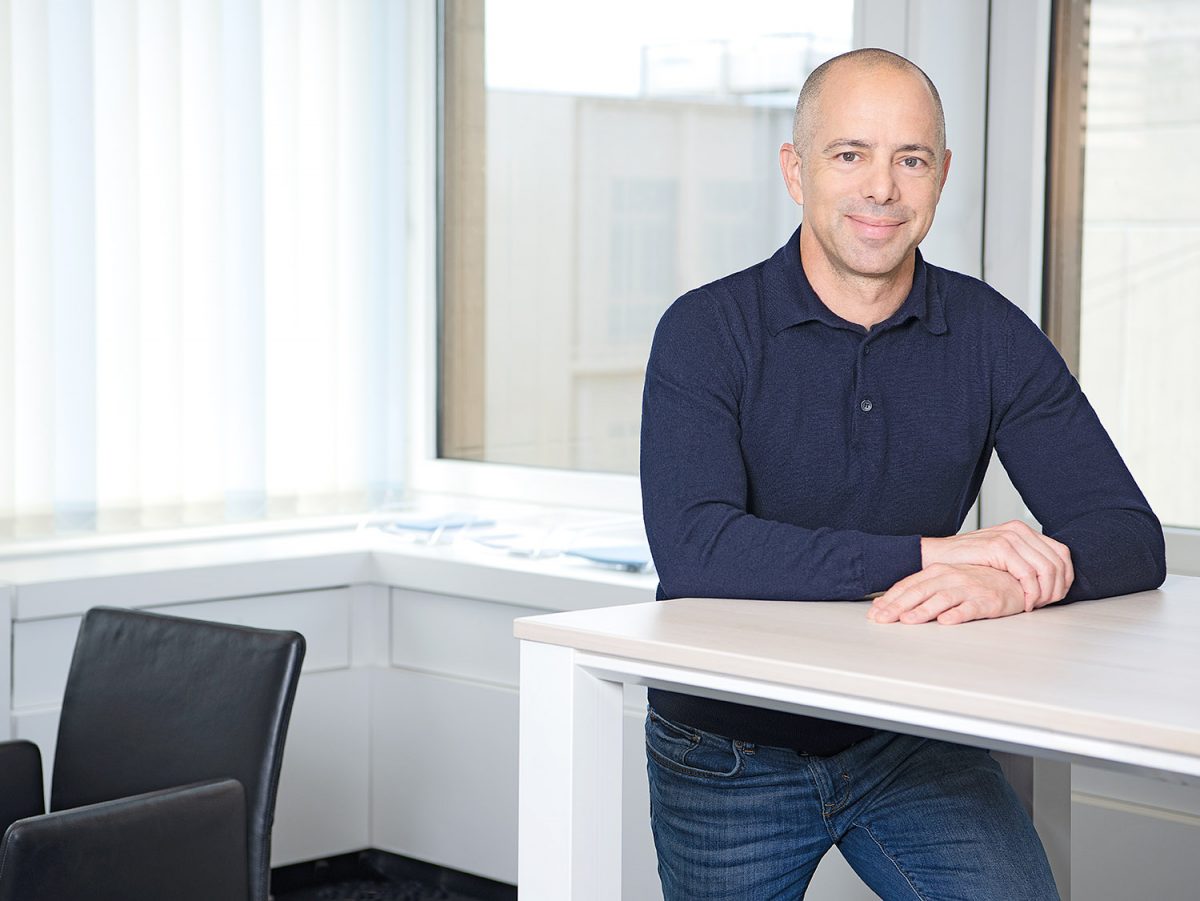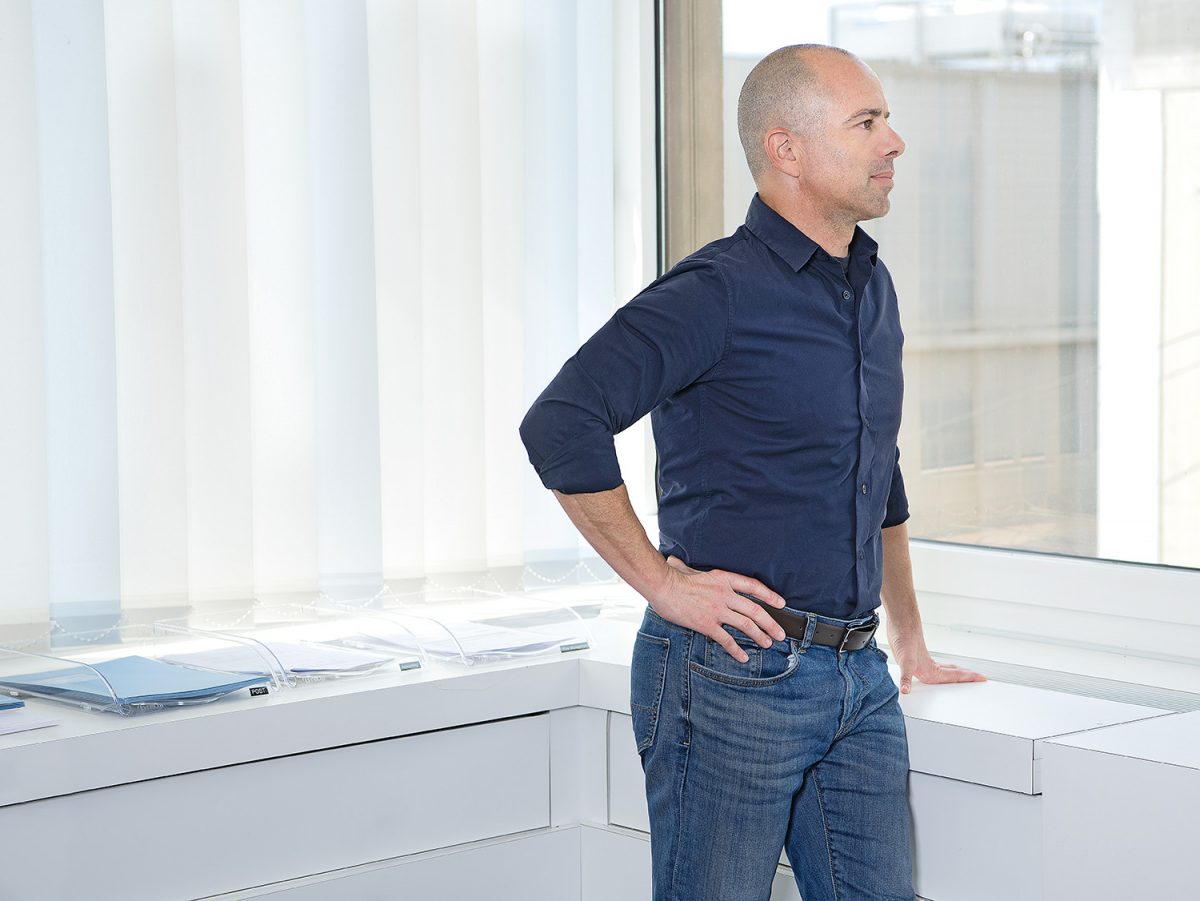Necessary innovation: Jonathan Pantanowitz
Livinguard’s unique technology has the potential to turn any material into a virus-killing weapon. Jonathan Pantanowitz, Executive Vice President of Business Development, has very real plans for this sci-fi dream: he wants to enable people to enjoy their normal lives again.
One sector that’s really come into its own in our new, pandemic-tainted reality is the hygiene and medical supply industry. Not to put too fine a point on it, but firms such as the Swiss-based Livinguard are in their element right now.

Jonathan Pantanowitz, Executive Vice President of Business Development at the company, puts it more diplomatically. "We are an enabler for you to get your life back," he declares.
"Most people’s lives have been, to a certain degree, taken away from them quite abruptly with lockdowns, curfews and the inability to go places to enjoy sports, art and culture. With our technology and products, we enable the public to go back to enjoying the things that make us human, the things that make us special."
Trusting in science
Far from just another grandiose spiel from a company that’s profiting from the current situation, Livinguard’s products are based on the science behind the properties of polycationic polymers.
Simply explained, polycationic polymers are large molecule structures that carry multiple positively charged ions. In contrast, viruses and bacteria carry negative charges.
As with opposite poles in magnets, opposite charges attract in chemistry, so when viruses and bacteria come into contact with a material containing polycationic polymers, they become adhered to the material.
Simultaneously, the positive charges distort or break the protein shells of the viruses. Since these shells protect the genetic material of the viruses, their destruction deactivates the viruses, rendering them harmless.
This knowledge isn’t new; it has been described in scientific literature for the past two decades, and Livinguard has been working with its applications since the founding of the company in Switzerland in 2013 by Sanjeev Swamy.
Its solutions have been tested by various independent organisations, including the Freie Universität Berlin and the Department of Environmental Science at the University of Arizona.
Bolstered by the favourable results from these independent tests, the firm is now seeking approval from the US Food and Drug Administration.
Reinventing the familiar
Given the current climate, one application has become particularly of interest recently – face masks. "We patented our masks several years ago," Jonathan reveals.

"When the pandemic began, we understood that the industry was at a turning point and that we were in a fantastic position to achieve two things. First, to offer the world a much-needed solution that is both sustainable and economical. Second, to create a mask that could actually destroy the virus."
Livinguard masks have a unique three-layer construction, with the polycationic Livinguard Antiviral Technology bonded into the fabric on the outermost and innermost layers, sandwiching the middle layer of melt-blown filter for added filtration.
Notably, the inner- and outermost layers contain an impressive 36 billion positive charges per square centimetre. Lab trials have demonstrated that fabrics treated with Livinguard’s technology are capable of destroying 99.9% of SARS-CoV-2, the virus that causes COVID-19.
That’s not all. The fabric can also stand up to 30 washes without compromising its effectiveness and six months of wear, which is estimated to replace about 210 disposable masks.
We see ourselves as a unique company that is in a unique position to bring to the world a solution that is much needed today.
Because the Livinguard technology continuously destroys viruses upon contact, the mask doesn’t have to be washed after every wear and promises a much lower chance of cross-contamination, such as when it is being put on or taken off.
Expanding horizons
Face masks are not the only products where Livinguard has seen success with the application of its technology. Jonathan says the company has also used polycationic materials in water and air filtration systems as well as personal hygiene products.
Its water filtration system has "given more than 50, if not 70 million people in disadvantaged regions access to clean water without the need for electricity". He believes that the potential applications are endless and can be found in almost every object encountered in everyday life.
"Our core technology can be incorporated into any material – from textiles and papers to plastics – and enable these materials to deactivate microbes and bacteria in a continuous, safe, environmentally friendly and permanent way," Jonathan says.
"We are looking at many other items that we encounter in the public domain, be it plane seats and tray tables, train seats, handholds in buses, or phone covers. Our scientists are working around the clock to refine the technology so that it can be applied to these areas."
The company is hoping to increase its presence in various markets and in various products by working with manufacturing partners. "We have a mission to enable better health and wellbeing for the millions of people all over the world who have limited access to modern healthcare and technology," Jonathan shares.
"We see ourselves as a unique company that is in a unique position to bring to the world a solution that is much needed today."
Guided by conscience
Livinguard isn’t operating in a vacuum; the company has competitors that are also working with antiviral material. However, Jonathan believes the firm’s unique technology will keep it ahead of the competition.
"Many of the competing products are metal-based, using silver, copper or zinc," he explains. "The negative effects of these solutions are two-fold. First, they are harmful for the environment if the metal leaches into the seas, rivers and lakes. Second, if one of the metals – for example, silver – is used in a face mask and its particles are inhaled, it can be extremely dangerous for the lungs."
These environmental and sustainability issues have only become more pressing in recent months. "One of the collateral effects of the pandemic is the incredible amount of waste generated by disposable face masks, which are made out of polypropylene, a type of plastic," Jonathan points out.
"All of it will end up contaminating the landfills, probably with the virus still on them. It’s quite devastating." There’s no doubt that washable, reusable polycationic materials are definitely a big stride in the right direction, but he isn’t content to stop there.
"When I think about sustainability, I like to call it a different name – corporate social responsibility," Jonathan says. "I feel that this represents a more comprehensive approach and the way that we at Livinguard are looking at sustainability.
"When we take this perspective, it also becomes about doing good, donating to society and coming up with solutions that help the less privileged in the world. It’s no longer just about creating solutions that are less harmful from an environmental perspective."
Jonathan cites the reusable feminine hygiene products that Livinguard technology has made possible as an example. "They enable young women in disadvantaged regions to enjoy their education, undisrupted by sickness from using unhygienic solutions," he explains.
As part of its CSR initiative, the firm has plans to set up the Livinguard Foundation, which will donate some of the business’s profits to selected causes.
"We like to think of ourselves as being a responsible company and part of the DNA of such an organisation is one that shows responsibility to its environment, its employees, people who are less privileged, and the public," Jonathan says. "It’s a journey and we have our work cut out for us, but this is where we want to be."